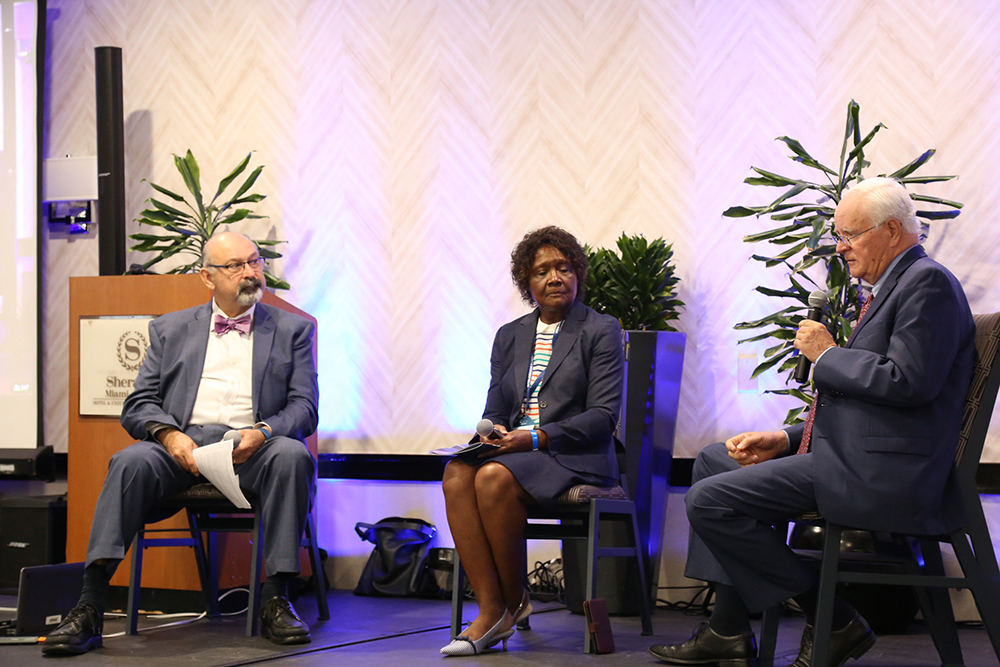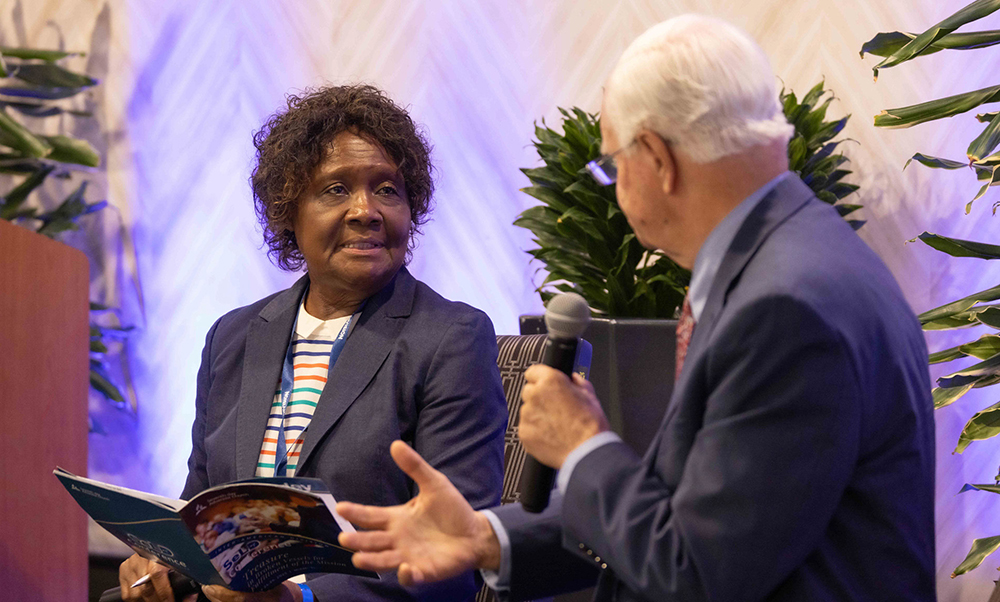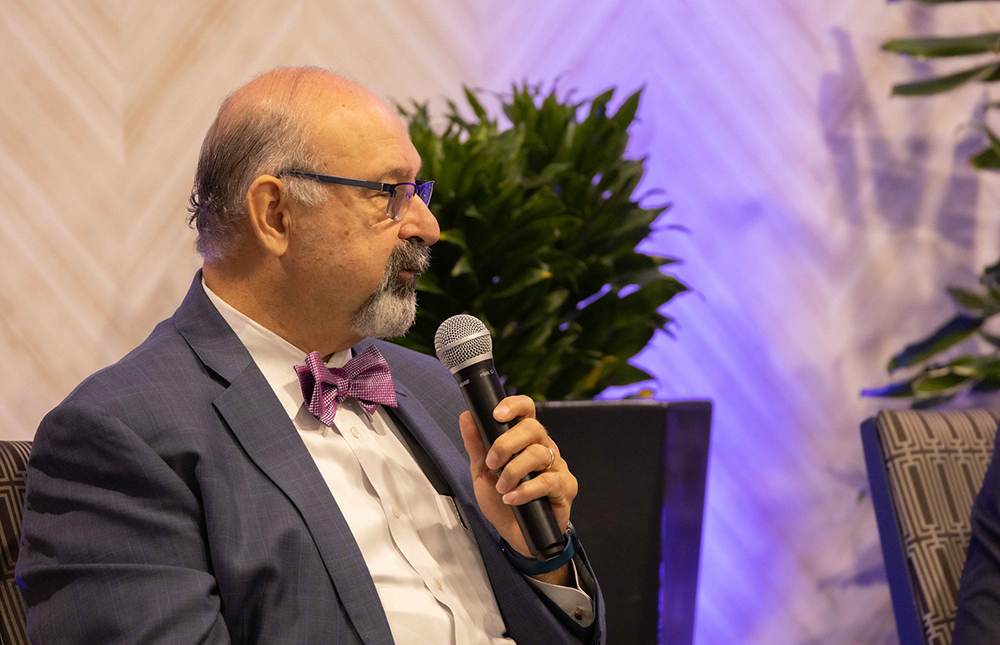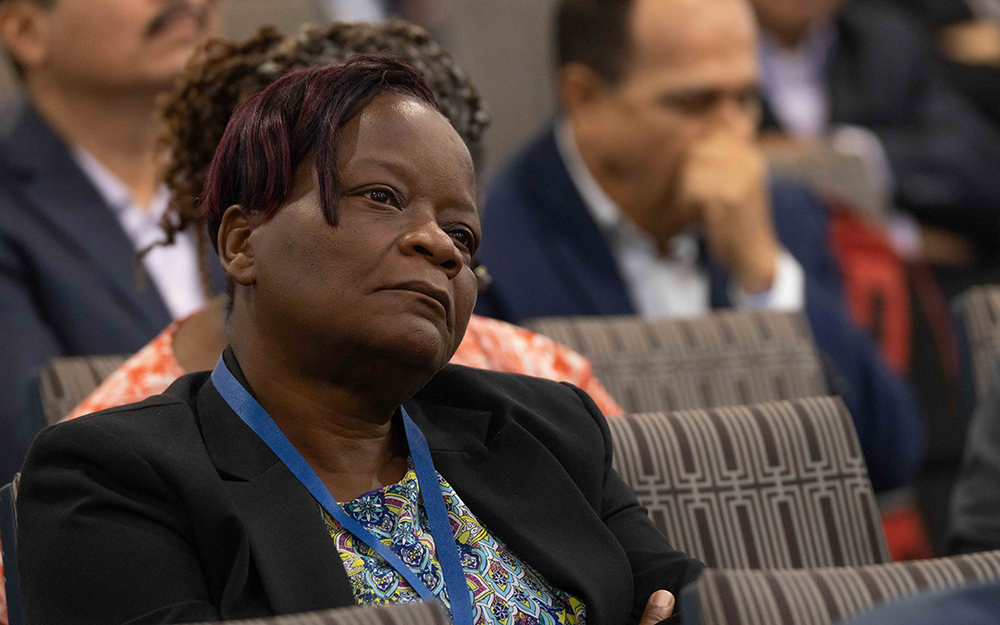Adventist Leaders Urged to Have Mechanisms in Place Before Crises Hit
August 4, 2023 | Miami, Florida, United States | Libna Stevens, Inter-American Division News
“Crisis is a time of intense difficulty, trouble or danger, a time when a difficult or important decision must be made,” stated Ella Simmons, former vice president of the General Conference of Seventh-day Adventists, as she began moderating a small panel of crisis management experts before hundreds of Inter-American Division (IAD) leaders on July 26, 2023.
The panel took place on the last day of IAD’s Segment Leadership Development Conference, where more than 400 church administrators, educators, department directors, pastors, and church elders traveled to Miami, Florida, United States, while over 1,000 more connected online during the three-day event.
There’s been talk about case studies, said Simmons, but the focus the panel will cover areas of crisis management in times of crises, she said.
“When we talk about a crisis, I think of it as a time of instability in an organization that requires a response and I think the first principle for leadership in dealing with a crisis moment is to make sure that resources are applied to the crisis,” said Lowell Cooper, retired former general vice president of the General Conference. Leadership cannot sit back and imagine or think that a crisis is going to somehow solve itself, he added. “There’s where I think we need to look at specific things when we respond to a crisis.”

L-R: Karnik Doukmetzian (left), general counsel of the General Conference, Ella Simmons (center), former vice president of the General Conference and Lowell Cooper (right), former general vice president of the General Conference lead a crisis management panel during Inter-American Division’s Segment Development Leadership (SeLD) Conference, July 26, 2023, in Miami, Florida, United States. [Photo: Libna Stevens/IAD]
“Timeliness of action is important then,” added Simmons.
It is one of the many components to respond, emphasized Cooper. A crisis could be produced externally, like the climate crisis the world is going through, he said. There could be a crisis that ends up in the media or it might be just internal to the organization too. “As leaders you can’t ignore it [crisis] and you need to apply resources.”
Simmons presented the delegation on what she came across on a YouTube video about news in the Seventh-day Adventist Church where members were standing in front of public cameras stating that they were there because their leaders failed to address a crisis. “On this video, they stood and declared that the leaders were not complying with policy, mentioned both legal and moral issues, and they said we would never come to the public but when we reported these things in the organizations, they came back against us,” pointed Simmons. “Even as we consider resources or addressing crisis what about the organization as a resource itself?”
Karnik Doukmetzian, general counsel of the General Conference, said that before getting into the issues of resources, looked at SeLD laders and said: “One half here could say what crisis? We have no crisis. The other half may say, where do we have a crisis?” It’s not about if or when, said Doukmetzian. ”We have to be expecting a crisis and as part of that expectation we have to be ready.” How to become ready? “When these individuals finally went to the public press with their issues, it was removed from an internal church matter and became a public matter. Now we have to address it,” he pointed.

Lowell Cooper, former general vice president of the General Conference discuses principles of crisis leadership during the panel as Ella Simmons, former vice president of the General Conference looks on, on Jul. 26, 2023. [Photo: John Garcia/IAD]
How are we going to address it? Who’s going to make the decisions? Who’s going to be the spokesperson? What is the message we are giving? asked Doukmetzian. “We have to look at all those things, because it’s not a question of ‘if’ but a question of ‘when,’” he emphasized.
The discussion turned to principles of crisis leadership.
Doukmetzian began explaining that the General Conference has a crisis management committee to deal with issues as they arise. Cases vary from removing missionaries in a time of war or in a particular location, to kidnapping that might take place of a church leader, to a bus accident that has killed 30, or 40 persons. “What can we do to be able to respond not only to the internal audience but external audience as well?” he asked.
“The team that we have established includes security experts, communication experts, church leadership or spokespersons, legal representative, insurance representation so that all the various aspects can be discussed in that committed,” said Doukmetzian. “We have to be prepared regardless of when a crisis happens.”
Anticipating crisis
Cooper chimed in sharing that one of the most critical things is to anticipate that there will be a crisis. “We have no idea what it will be, but we can anticipate that there will be a crisis and we can do some preparatory activity to respond to crisis at any level whether at a local church or a local conference or union. “You prepare on what you can do in a crisis.”

Karnik Doukmetzian, general counsel of the General Conference says church leaders need to be prepared to deal with a crisis. It’s not if or when a crisis strikes but having mechanisms in place when a crisis strikes. [Photo: John Garcia/IAD]
Generally, the person authorized to speak is an officer, but communication experts have the training to speak in public, added Cooper.
It’s important to have mechanisms in place to deal with internal crises as well, said Simmons.
Social media and the internet have changed very much how we do business, said Doukmetzian. “What happens on the campus of Montemorelos University will not stay on the campus of Montemoreos and it’s not going to take five weeks for that information to float around the world, but it will take five minutes,” he said. The old days brought time and opportunity to prepare a response, but that luxury is not available anymore, he added. “That’s when the questions start to come and it’s up to us to be prepared to answer those questions.”
Fairness, justice, and transparency
Whatever the case, crisis moments should be handled promptly with fairness, with justice, with transparency, added Cooper. “Often times, issues that presents a crisis to an organization may deal with the credibility or integrity of a leader and responding to that kind of crisis requires that we be fair, we do not make prejudgments, and deal with the data we have at the moment,” he said.

A SeLD delegate listens in during the panel discussion on Jul. 26, 2023. [Photo: John Garcia/IAD]
“It’s chaos, crisis is unpredictable and a lot of times we freeze and don’t’ react and that’s why having the preparation allows to have some control over the crisis,” emphasized Doukmetzian.
Two essential things in an organization to do to prevent a crisis includes ethical conduct, which means respecting the policies of the church, its constitutions, by-laws, and governance documents, as well as having a safe place to report threats, explained Cooper.
A safe place to report
Doukmetzian explained that the Seventh-day Adventist Church has set up a mechanism that is available around the world to individuals, especially for employees to be able to report without fear any wrongdoing or misconduct they come across.
Adventist.ethicspoint.com is an easy to navigate website that allows users to submit their location or division region and managed by an independent third-party company that is not the Seventh-day Adventist Church and complaints are keep confidential, explained Doukmetzian.
“Every report that comes in is taken seriously and investigated by the appropriate individuals,” said Doukmetzian. Depending on where the complaint is from, higher organizations will oversee the complaint or issue presented. There’s a safe way to report misconduct in the church and wrongs need to be looked at and reviewed, he added.
Simmons pointed back to the Youtube video of church members addressing public. “They made a point because it involves all of us as leaders,” she said. “We don’t want to hurt each other or cause problems so sometimes we are quiet, sometimes we fear rejection or retribution, but most often we don’t want to cause problems. But we must be aware that while we protect each other, sometimes we expose the church to great risk.”
To protect and preserve
Regarding the procedure, Doukmetzian said that a lot of times issues arise that should be dealt with internally in the church. “We have an avenue for individuals to come forward instead of going to the courts or going to the press, but it also puts the responsibility on us [as leaders] to deal with those issues,” he said. “A lack of action exposes our church more and we don’t want the courts in the internal affairs of the church.”
Adding to that Cooper said: “Leadership has been put in place to protect, to preserve and to accomplish the purposes of the church and re have a really robust system with constitutions and bylaws, and if leaders will respect those governance documents and respect organizational boundaries, we will earn the confidence of our constituency.”
What happens when policy is either outdated or just a mistake in the first place? Simmons asked.
“We need to know that in the Seventh-day Adventist Church’s policy is dynamic, it can be changed, circumstances, times and situations require us to come back to look at policies and make amendments,” Cooper said.